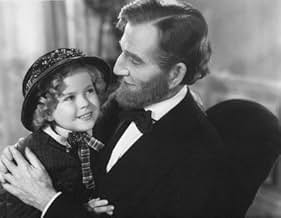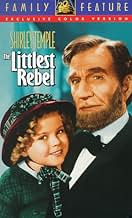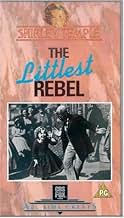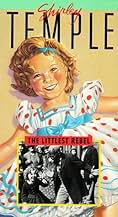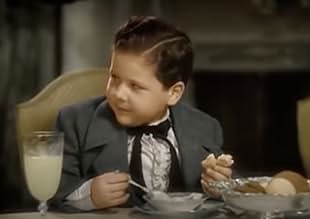Shirley Temple's father, a rebel officer, sneaks back to his rundown plantation to see his family and is arrested. A Yankee takes pity and sets up an escape. Everyone is captured and the off... Read allShirley Temple's father, a rebel officer, sneaks back to his rundown plantation to see his family and is arrested. A Yankee takes pity and sets up an escape. Everyone is captured and the officers are to be executed. Shirley and "Bojangles" Robinson beg President Lincoln to interc... Read allShirley Temple's father, a rebel officer, sneaks back to his rundown plantation to see his family and is arrested. A Yankee takes pity and sets up an escape. Everyone is captured and the officers are to be executed. Shirley and "Bojangles" Robinson beg President Lincoln to intercede.
- Director
- Writers
- Stars
- Awards
- 4 wins total
- Sgt. Dudley
- (as Guinn Williams)
- Birthday Party Guest
- (uncredited)
- Birthday Party Guest
- (uncredited)
- Black Boy
- (uncredited)
- Party Guest
- (uncredited)
- Birthday Party Guest
- (uncredited)
- Railroad Ticket Clerk
- (uncredited)
- Birthday Party Guest
- (uncredited)
- Birthday Party Guest
- (uncredited)
- Director
- Writers
- All cast & crew
- Production, box office & more at IMDbPro
Featured reviews
The second is a chance to talk to your children about the way black characters and white characters interact in this film. Some younger children may be confused by the divide between the black characters and the white characters (especially those who attend racially-diverse schools,) but this is a good time to explain to them the racist attitudes of the time period, and ask them how it makes them feel.
The best way to combat racism is not to sweep it under the rug, but to teach children where we were, how far we've come, and how far we still need to go. Give children the credit they deserve, they will understand.
This film is a perfect opportunity to relate to your children and instill guidance.
The story is set on a Southern plantation where Herbert Cary (John Boles) and his wife, Helen (Karen Morley) honor their child, Virginia, better known as Virgie (Shirley Temple), with a birthday party where she and her little guests are gathered together with ice cream and cake along with tap dancing entertainment by Cary's slave/ butler, Uncle Willie (Bill Robinson). Shortly afterwards, the party is disrupted by startling news that war has been declared between the states. Enlisting in the Army, Cary leaves his wife and child under the care of Uncle Willie. With Yankee scouts invading their property, Virgie, while playing soldier, sling shots Colonel Morrison (Jack Holt), addressing herself as a "confederate." In spite of their differences, Morrison, a father himself, takes an immediate liking to Virgie, later rescuing her from the threat of the villainous Sergeant Dudley (Guinn Williams) for not revealing the whereabouts of her "daddy." After the Cary estate is burned to the ground, causing Mrs. Carey to fall ill and die within three weeks time, Cary leaves his post to take Virgie over to Richmond where she's to be placed in the care of her Aunt Caroline. Complications arise when Carey is recognized and captured, separated from his daughter, imprisoned along with Morrison for helping him, each charged with treason and sentences to be executed.
With 20th-Fox specializing in Southern stories set during, before or after the Civil War, THE LITTLEST REBEL is a fine example capturing Southern hospitality and flavor with the reconstruction of plantations and notable songs from that era including "Swanee River" (by Stephen Foster) sung during opening credits; "Turkey in the Straw" (tap dance by Bill Robinson); "Those Endearing Young Charms" (sung by Shirley Temple); "Sometimes I Feel Like a Motherless Child" (by Thomas Moore and Matthew Locke); "Polly-Wolly Doodle" and "Polly-Wolly-Doodle" (sung by Temple and reprized during closing titles).
Of its cast members, Bill Robinson and Willie Best provide lighter moments to their traditional servant roles. Best's performance as a shiftless and comical slave gives the impression that his role as James Henry was actually intended for Stepin Fetchit. While Best doesn't imitate Fetchit's comical methods to the extreme, he works well alongside Robinson as his comic foil doing a brief takeoff in the popular "Amos and Andy" radio show tradition in the question and answer session where Best asks Robinson: "Why is a shoe called a shoe?" Although portraying their roles through stereotypes, Robinson comes through as an intelligent, caring and sensible slave with a talent for dancing. He's very convincing and sincere through his interacting with Temple, which is why they work so well together. John Boles satisfies as the easy-going father turned soldier and accused spy while Karen Morley, despite of her screen limitations, makes due with her role.
Due to controversy in how the black performers are portrayed, cable television revivals of THE LITTLEST REBEL in recent years have been limited, though shown frequently at some point on American Movie Classics (1996-1999), the Fox Movie Channel, and availability since the 1980s on home video and afterwards DVD either in black and white or colorized formats. In May 2006, THE LITTLEST REBEL was one of the films chosen as part of its subject matter of "Black Images on Film" theme co-hosted by author Donald Bogle, where he and host Bob Osborne discussed the film, performances of Robinson and Best, as well as a scene where Temple gets herself corked up to avoid Yankee soldiers.
THE LITTLEST REBEL, along with THE LITTLE COLONEL, were intended as screen entertainment with no intention to offend, yet something to consider as a reflection of the times, and how a Civil War story such as this is seen through the eyes of Virgie Carey, the littlest rebel. (***)
The story is simple. Shirley T plays a little Southern girl named Virgie Cary a adorable moppet who seems to hold the social graces that would put Emily Post to shame. Because she is so cute and polite, everyone finds her irresistible. Oh! She is also a TERRIFIC tap dancer to boot! One sunny afternoon (April 12th) while she is celebrating her birthday, news flies in the door that Fort Sumter was fired upon and The War between the States has begun! Virgie is the child of Southern parents on a beautiful plantation with the happiest bunch of slaves that you ever seen---so we know what side her father will fight for.
Life for Virgie changes somewhat after that. Like any child in the Civil War, she misses her father who has gone off to battle. But Virgie has incredible spunk and bravery when she confronts the "Yankee" army and actually seems to want to do battle with them when some of the soldiers get mean with her and try to steal from her home and pushes her mother roughly down the stairs. Luckily, her bravery and stubborn pluck captures the heart of a Union Commander who later tries to help her father. When Virgie's mother is stricken with an illness and dies, her father is captured and the kind Union Commander is also implicated. There is only one person who can save them....Can Virgie charm the socks off of Abraham Lincoln in Washington D.C and get a reprieve for them? African American's will not view this movie favorably because it shows a preposterous view of the treatment of slavery. The slaves seemed so happy that they don't want to leave. The Cary's seem to be kind slave owners---the slave quarters are furnished tastefully like a roadside motel. There are no beatings or mention of abuses. Of course, there are dreadful black stereotypes like John Henry.
But the most interesting actor besides Shirley T is Bill "Bojangles" Robinson whom I consider one of the greats in tap dancing. Temple and Robinson enjoyed a very close friendship outside the studio. It was said when Temple saw Bill Robinson on a movie set, she had a mad compulsion to run up to him, take him by the hand, tug at him and look into his eyes and smile. When Bill Robinsonlooked down and saw her tugging at his hand, he couldn't resist her childish charm and smiled back at her. Temple maintained that "Uncle Billy" was the one adult who never treated her like a child but as an equal adult. Robinson said that Temple was one of the most talented young person when it came to dance--all he had to do was show her a routine twice and she picked it up immediately. Robinson also displayed a fatherly protective figure with Temple. A story was said that when Temple married John Agar, Robinson congratulated him but said "Be good to my little girl or I'll kill you" If you watch the interaction between these two on film, you could see Shiley Temple's eyes light up like a Christmas tree. I am sure that they felt some type of respect for each other off screen that carried into their outside lives. Relationships between black and white actors were not forbidden at that time but they were not encouraged. But we could say Temple and Robinson have been dubbed the first inter-racial couple on screen.
Despite the false picture of slavery, The Littlest Rebel entertains us thanks to the talents of Bill Robinson and Shirley Temple. There is a tap dancing scene halfway in the picture that can't be missed. Sure, the plot is campy and corny, and Shirley's sugar sweet demure is gut wrenching---but for some reason it entertains.
The black people are not only less intelligent than the whites (notice the girl so dumb she can't even remember a single line her mother told her to memorise to impress the young white child star - or perhaps she's just so nervous in the presence of the superior species that she can't remember), but they're completely happy being enslaved.
They absolutely love being told what to do by the six year old landowner's daughter, and the neighbourhood slaves just wait around for young Shirley to lavish some attention on them.
The thing I most regret about the film was that they forced the blacks to dance and entertain their white hosts like a bunch of chained elephants or circus freaks.
Its always a bad sign when the civil war is portrayed as a distruption to the desired state of affairs, as it is here and in Gone with the Wind.
1/5
Only youngsters, who don't yet understand that the only difference between white folks and black folks is skin pigment, which only evolved from a group of people living in an ultra-sunny climate for years, will be able to enjoy this film. But perhaps its better for society if you don't show it to them - the young are so impressionable, after all.
UPDATE: Can I point out that I've noticed people don't like this review, and I'm not surprised; its intentions were so innocent, it feels a shame to accuse it of causing offense, but unfortunately, I'd still suggest this one not be shown to impressionable kids for the reasons I have outlined above.
Did you know
- TriviaBoth John Boles and Bill Robinson nearly drowned while trying to cross a raging, 15-foot river for an escape scene that was cut from the film.
- GoofsWhen the Union soldiers are caught looting, the commanding officer orders them to be flogged. The US Army according to the "History of the United States Army" stopped flogging at the beginning of the Civil War in 1861--this scene is obviously later in the war as Union forces are occupying the south.
- Quotes
Virginia 'Virgie' Cary: [singing] Oh, I eat watermelon and I have for years. Sing Polly-Wolly-Doodle all the day! I like watermelon but it wets my ears. Sing Polly-Wolly-Doodle all the day!
- Alternate versionsAlso available in a computer colorized version.
- ConnectionsFeatured in Of Black America: Black History: Lost, Stolen or Strayed (1968)
- SoundtracksPolly Wolly Doodle
(1880) (uncredited)
Traditional
Modified Music by Sidney Clare (1935)
Modified Lyrics by Buddy G. DeSylva (1935)
Sung by Shirley Temple with Bill Robinson
Reprised at the end by Shirley Temple
- How long is The Littlest Rebel?Powered by Alexa
Details
- Runtime
- 1h 13m(73 min)
- Color
- Aspect ratio
- 1.37 : 1


